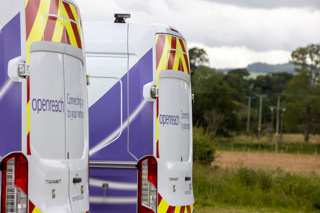BT has changed the way it reimburses its employees after discovering a major fraud that netted two of its managers more than £150,000.
The sophisticated scam involved scores of fake parking tickets, which were used to claim back cash on company expenses by BT Openreach employees.
Overtime hours were also invented, along with damage to homeowners' property during Broadband installation, during a two-and-a-half-year period.
The con finally came to light after senior management received an anonymous tip-off and the subsequent investigation revealed the scale of the deception.
Phillip Tamplin, 53, and Christopher Starrs, 50, another BT Openreach manager, were charged with fraud, and a number of staff were fired for wrongly claiming cash.
Duncan Webb, BT director of fleet, told Fleet News: “In an organisation the size of BT, there will always be a few bad apples. But this isolated case proves we’re effective at catching and prosecuting wrongdoers.”
Tamplin, who made £124,000 from the scam, was found to have submitted more than 100 fraudulent claims between October, 2010, and May, 2013, while Starrs made £28,000-worth of bogus claims.
The judge, Stuart Trimmer QC, told the pair: “This was a sophisticated fraud perpetrated over a very long period of time.
“It involved over 100 or so false claims, made within the context of a large organisation that was open to fraudulent activity.
“You both knew how it could be conducted, concealed and be made to benefit each of you personally.”
Key to the scam’s success was how employees were allowed to claim back parking tickets on expenses – a warning for other fleets.
Like many organisations, BT's vehicles are at risk of being clamped while engineers carry out work. Its claims process allowed drivers to pay on-the-spot fines rather than suffer any potential downtime.
The judge said: “You both saw that was very easy to take advantage of and so, relying on an originally genuine ticket, claims were mocked up to indicate that there had been clamping or fines.”
Tamplin and Starrs claimed BT vehicles had been clamped by parking authorities, and paid off engineers to help them make the claims.
The judge continued: “You both knew that unless there was a determined attempt to investigate the claims, you would not be found out.
“The essence of this activity required other employees to pass money back to you. The only way it could work would be for others to make claims for you and pass the money back to you.
“It is said that there was a culture of this fraud. That may or may not have been the case.
“It is said that others are fortunate not to find themselves in the dock with you – and that is true.
“They must bear their own responsibility, but the breach of trust you participated in shows that you were prepared to compromise other employees.”
BT, which operates a fleet of around 27,000 vans and 5,300 company cars, declined to say how many employees had either been disciplined or sacked as a result of the investigation, but Webb said action had been taken to ensure the expenses system was more robust.
He explained: "In terms of what has changed since this case came to light, all vehicle fines that can be paid by credit card are now settled centrally, meaning individuals are no longer involved in the payment process. Wheel-clamping on private ground has also been outlawed in the UK – closing a further loophole.
"These are just some of the numerous measures in place across the company which help us to prevent fraud and criminality."
Tamplin and Starrs both pleaded guilty and were sentenced at The Old Bailey earlier this month.
Tamplin, of Gleneagle Road, Streatham, south London, who had worked for BT since he was 16, was jailed for two years.
Starrs, of Eastcote Lane, Northolt, Middlesex, who had worked for BT since 1988, was given a 16-month sentence, suspended for two years.
BT’s previous policy of allowing employees to pay parking fines and then claim back the cash through their expenses is unusual, though not unique.
It was claimed in court that the company allowed the practice because staff were regularly forced to park their vans illegally to carry out their work. The court heard BT pays out around £1 million in fines in London alone every year.
However, parking tickets are not exclusive to BT. FN50 data showed that 19 leasing companies processed just over 124,000 fines last year, totalling more than £7.2 million, if all fines were fixed at £60.
However, unlike BT, many fleets (or their leasing provider) pay the fine in the first instance and then claim it back from the employee responsible. They rely on precisely worded contracts of employment that enable them to identify company car and van drivers as responsible for a fine and take action to recoup the costs involved.
Rebecca Lynch, joint head of employment at law firm Gordon Dadds, told delegates at an ACFO seminar that if employers give staff a contract of employment, with the right flexibility, then they should not have a problem enforcing their payment of the fine.
This would normally be deducted from their pay, either in one lump sum or perhaps over time if the payment is large (fleetnews.co.uk, June 6, 2014).
Written consent for the costs to be charged and deducted from wages, however, must either be contained within the signed employment contract or directly communicated separately by letter to employees which they have countersigned.
In BT’s case, as Webb explained, employees are now no longer involved in the payment process and its expenses regime has been tightened-up to avoid any future abuses.
This is especially timely considering Openreach is undertaking a major recruitment drive, which will also see its fleet grow significantly.
The company announced its intention to hire a further 500 full-time staff in October, just five months after launching a recruitment drive for 1,600 engineers.
The move forms part of BT’s on-going efforts to meet Ofcom’s new quality of service requirements around faster fault-fixing and installations.
“We are seeing strong demand for our superfast fibre service, as well as our ultra high-speed business services like Ethernet,” explained Joe Garner, Openreach chief executive.
“These new engineers will help ensure that Openreach continues to meet and exceed the rising demands of our customers in an internet age.”
As a result, the total number of new recruits announced by Openreach last year was around 2,400, and some of those will be benefitting from what is the biggest bulk vehicle order BT has made in the past three years.
Consisting of Fiat, Ford and Vauxhall models, they include around 3,500 replacement light commercial vehicles and 1,500 vans for new employees.





















Login to comment
Comments
No comments have been made yet.